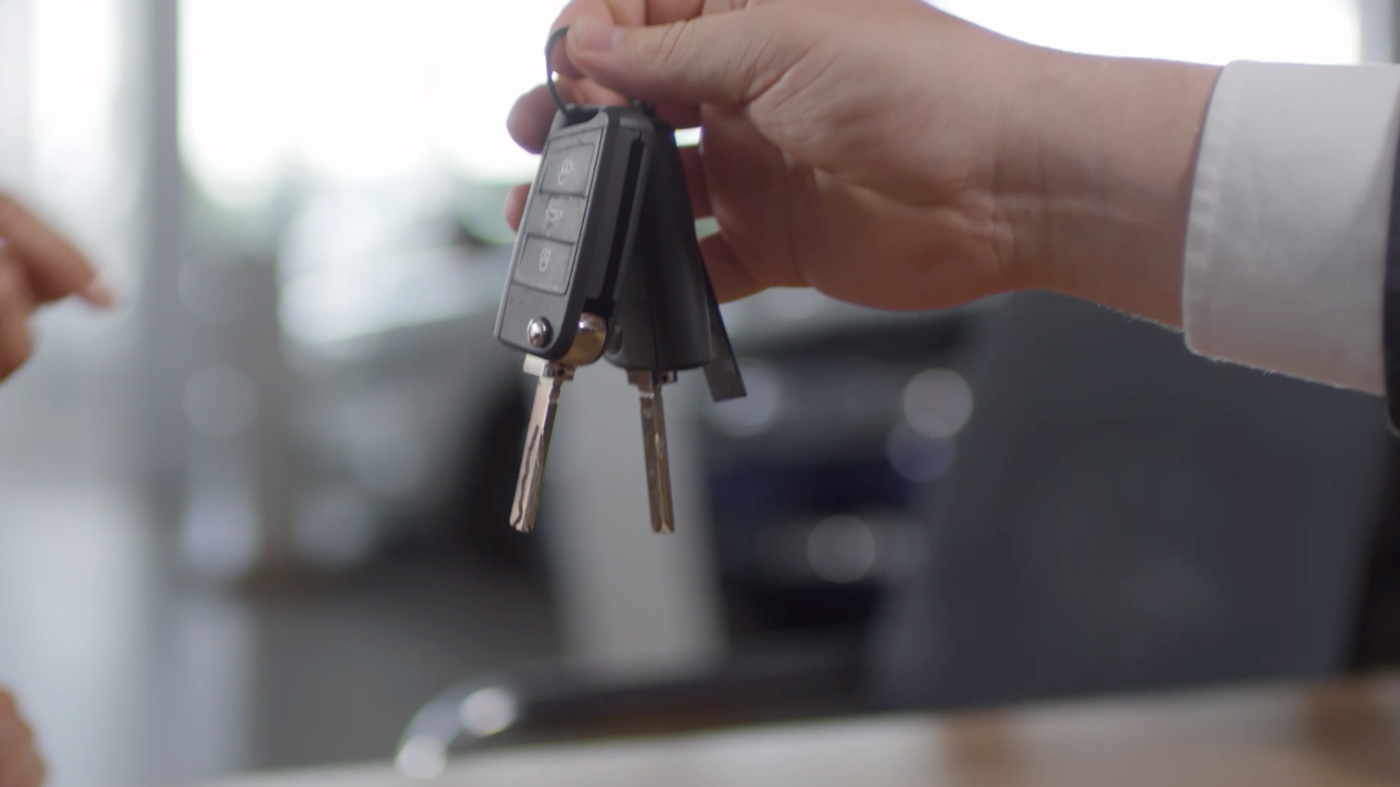What to Consider When Insuring Your New Car
In the market for a new car? Biggest question is, does a new car increase my insurance? Learn how your next car may affect your insurance premiums.
It’s easy to get swept up in the excitement of buying a new car, but remember that there will be expenses other than just the purchase price. One of those costs is insurance for a new car. Auto insurance is important to get because it can help cover damage to vehicles and property, as well as injuries to people involved in crashes. Almost all states have laws that will require you to insure your new car, but even where they may not, your lender probably will. So, read on and find out about some of the things that help answer the question, “Is insurance more expensive for new cars?”
 Adobe
Adobe
How Insurance Rates Are Set
These are four of the things that insurance companies consider when they set the cost of insurance for a new car:
- Sticker price. Repairs and parts for a luxury car will carry a higher price than they would for an economy car. Whether an expensive car is damaged a little or a lot, it will cost more to fix than a cheaper car, and that’s a big reason it can cost more to insure. According to Consumer Reports, several German automakers are clustered as the most expensive brands to repair and maintain, namely Audi, BMW, Mercedes-Benz and Porsche.
- Type of car. Another factor that goes into the cost of insurance for a new car is its make and model. The faster a car can go, the greater the risk of a crash—and greater risk means higher insurance rates. Insurance companies also know that different car types appeal to different types of drivers. A car with a lot of horsepower will appeal to fast, aggressive drivers and will likely have a greater risk of a severe claim than something like a minivan. For more-detailed information, the Insurance Institute for Highway Safety (IIHS) compiles insurance loss data based on make and model of car.
- Vehicle size. Insurers take vehicle size into consideration because losses for vehicle damage are higher with larger, heavier vehicles since they tend to do more damage in a crash. However, rates of injury claims are lower for larger vehicles because occupants are subject to less force and have more survival space inside the passenger compartment of a large vehicle.
- Safety features. IIHS performs crash tests on new cars and publishes their findings at IIHS.org. A car that gets good ratings is going to be safer to drive and cost less to insure. Advanced Driver-Assistance Systems (ADAS) like automatic emergency braking and lane-departure warning systems can help prevent crashes, and air bags and passive-restraint seat belts can help minimize injury if a collision does occur. Ironically, the driver assistance tech in a new car that helps decrease vehicle crashes can also increase repair costs when a crash does happen. Even the once-simple job of replacing a windshield costs more for new cars that feature ADAS technology and have sensors that need recalibrating.
If you’re still undecided about buying a new or used car, here is some information that may help you choose.
Learn moreWhich Comes First—the Insurance or the Car?
Once you’ve decided on the new car you want to buy, you might be unsure of whether you can drive it off the lot before getting insurance for it. Or maybe you already know that most insurance companies have a new car insurance grace period, provided you have an existing car insurance policy with them.
Your insurance agent can confirm whether they offer a grace period or not and will tell you how long you have to insure your new car, typically 7 to 30 days. If you’re happy with your current auto insurance carrier, you can usually switch insurance to a new car by logging into your policy online or through your insurer’s mobile app, or by calling your agent.
If you don’t have an auto insurance policy already in effect, in almost all cases you will have to get one before you can register your vehicle with the DMV. And of course, driving without insurance could have major consequences.
 Adobe
Adobe
Customize Your Auto Insurance Coverage
Before you purchase insurance for your new car, you’ll want to learn the different types of coverage available—each applies to a different situation. While the last few types in the following list are not mandatory, they’re still valuable in certain situations. Some, like new car replacement insurance, might be more suited to your situation than others.
- Liability Coverage applies to bodily injury and property damage. Bodily injury liability is applied if you are at fault for a crash that causes injuries to other people; property damage liability is for when someone else’s vehicle or property is damaged and you are at fault.
- Collision Coverage covers damage to your vehicle from a crash, regardless of who is at fault.
- Comprehensive Coverage is classified by the nonprofit research organization Highway Loss Data Institute into three groups: theft; glass damage caused by rocks and other non-collision events; and damage from other sources, including collisions with animals, acts of nature, fire and vandalism.
- Uninsured Motorist Coverage covers hit-and-run incidents and situations when you’re in a crash with someone who’s driving without insurance.
- Underinsured Motorist Coverage takes effect when another driver is at fault but your losses are greater than the amount of coverage they have.
- Medical Payments Coverage applies to injuries sustained by occupants of your vehicle (including you) if you are at fault in a crash.
- Personal Injury Protection Coverage pays for your crash injury costs, no matter who caused the crash, in states with no-fault insurance systems.
- GAP Coverage is used to cover the difference between what you owe on your car and what it’s worth if it’s stolen or deemed a total loss.
- Rental Reimbursement Coverage will cover the cost of a rental car when your vehicle is undrivable after a crash.
- Full Glass Coverage covers the cost—with no deductible—to repair or replace any of the car’s window glass if it gets chipped or broken.
- New Car Replacement Coverage takes effect in the event your vehicle is declared a total loss. With this coverage you can pay the deductible and get a brand-new vehicle of the same make and model as the totaled vehicle.
- Classic Car Insurance covers the full appreciated value (determined at the time the policy is issued) of a vintage vehicle.
Insurance Premiums for a New Car: What It Means for You
The best way to learn what you’ll pay for insurance is to talk to your agent. Identify several vehicle models you’re considering so the agent can give you insurance quotes to compare and answer questions about the different types of coverage available. With the insurance information you need, you’ll be one step closer to driving your new car.
 Adobe
Adobe
4 Ways to Get a Great Insurance Rate
There’s no denying that car insurance prices have been rising. The Bureau of Labor and Statistics reported that in March 2024, car insurance costs rose 2.6%—triple the 0.9% increase that happened in February. That’s reason enough to explore ways to reduce your rate. Here are four things you can do:
- Maintain a good driving record. Rates can be affected by how often claims are filed (claim frequency) and also the size of the claim payments (claim severity). A good driving record is usually an indication that you’re a safe driver, and it will help keep your insurance rates down.
- Set a higher deductible. Talk with your agent about an amount you can afford, because you’ll be responsible for paying that deductible if you make a claim.
- Avoid submitting small claims. When the cost of a repair is only marginally higher than your deductible, it may make sense to pay for it out of pocket instead of submitting a claim, which could end up raising rates.
- Bundle your policies. Most insurance companies offer more than just auto insurance. Consider bundling your auto insurance with other policies, such as home insurance or renters’ insurance, to take advantage of savings. Let’s say you already have a homeowner’s policy with one insurer; you can call an agent and inquire about adding an auto policy to see how much you might save in comparison to other insurers. Or you can look around to see which insurers have the best insurance bundling offers.
This information is being provided for general informational purposes only. The Auto Club Group does not assume any liability in connection with providing this information.
Coverage is subject to all policy terms, conditions, exclusions and limitations. Discounts and savings opportunities subject to eligibility requirements. Subject to underwriting requirements. AAA Insurance is a collection of AAA branded insurance products, services, and programs made available to qualified members. Personal lines insurance is underwritten by Auto Club Insurance Association, MemberSelect Insurance Company, Auto Club Group Insurance Company, Auto Club Property-Casualty Insurance Company, The Members Insurance Company, Universal Insurance Company, Auto Club South Insurance Company, or Auto Club Insurance Company of Florida. ©2024 The Auto Club Group. All rights reserved.
